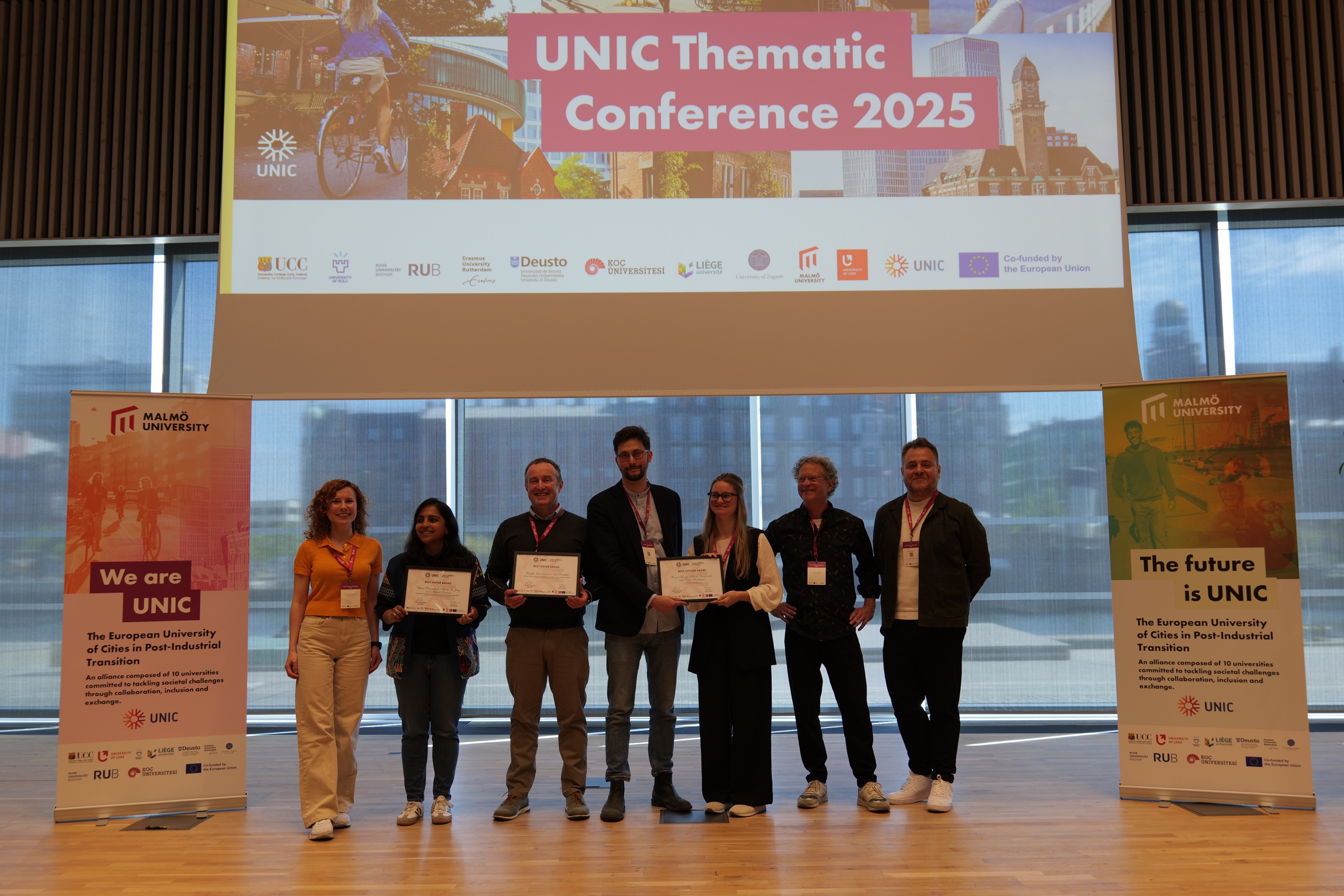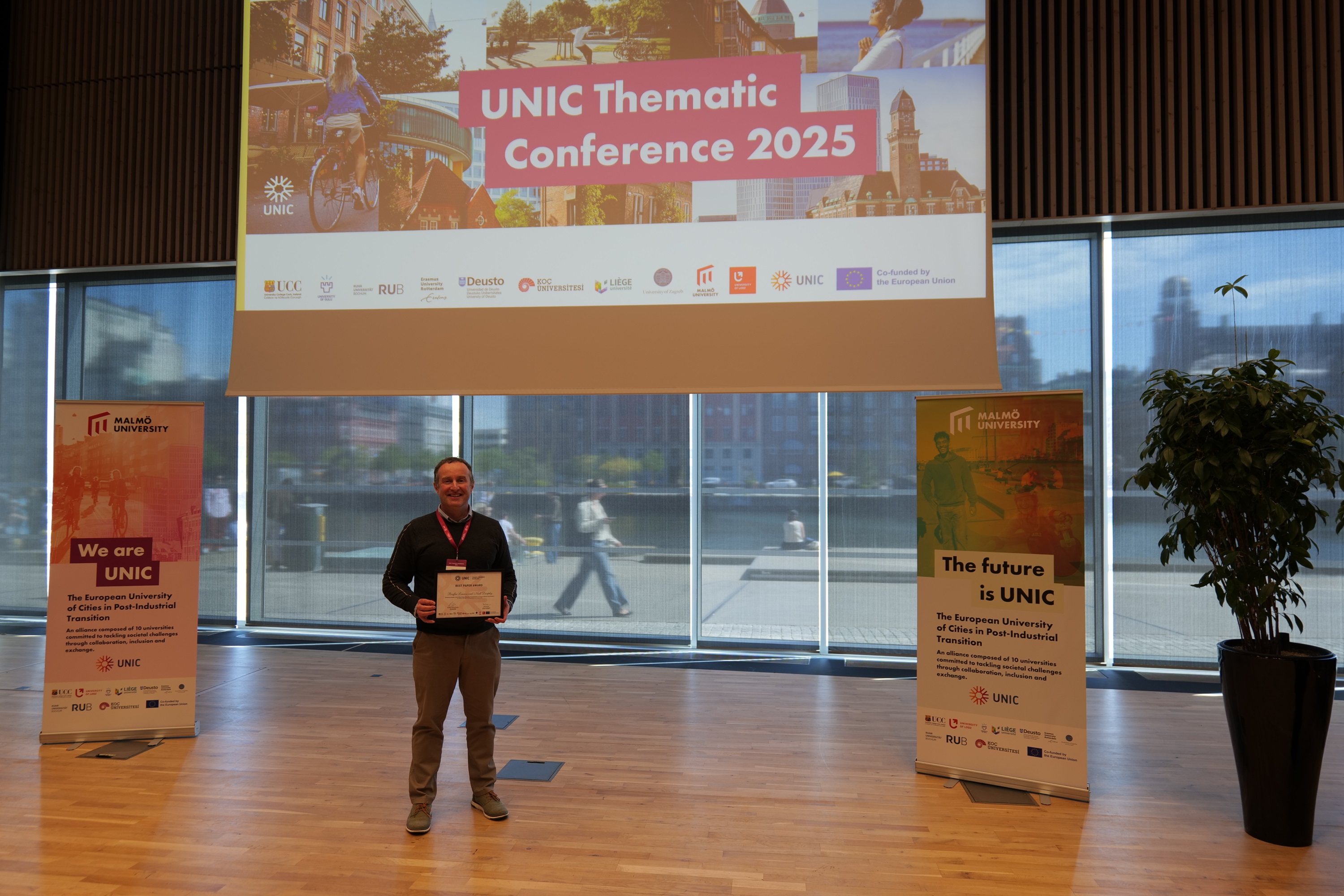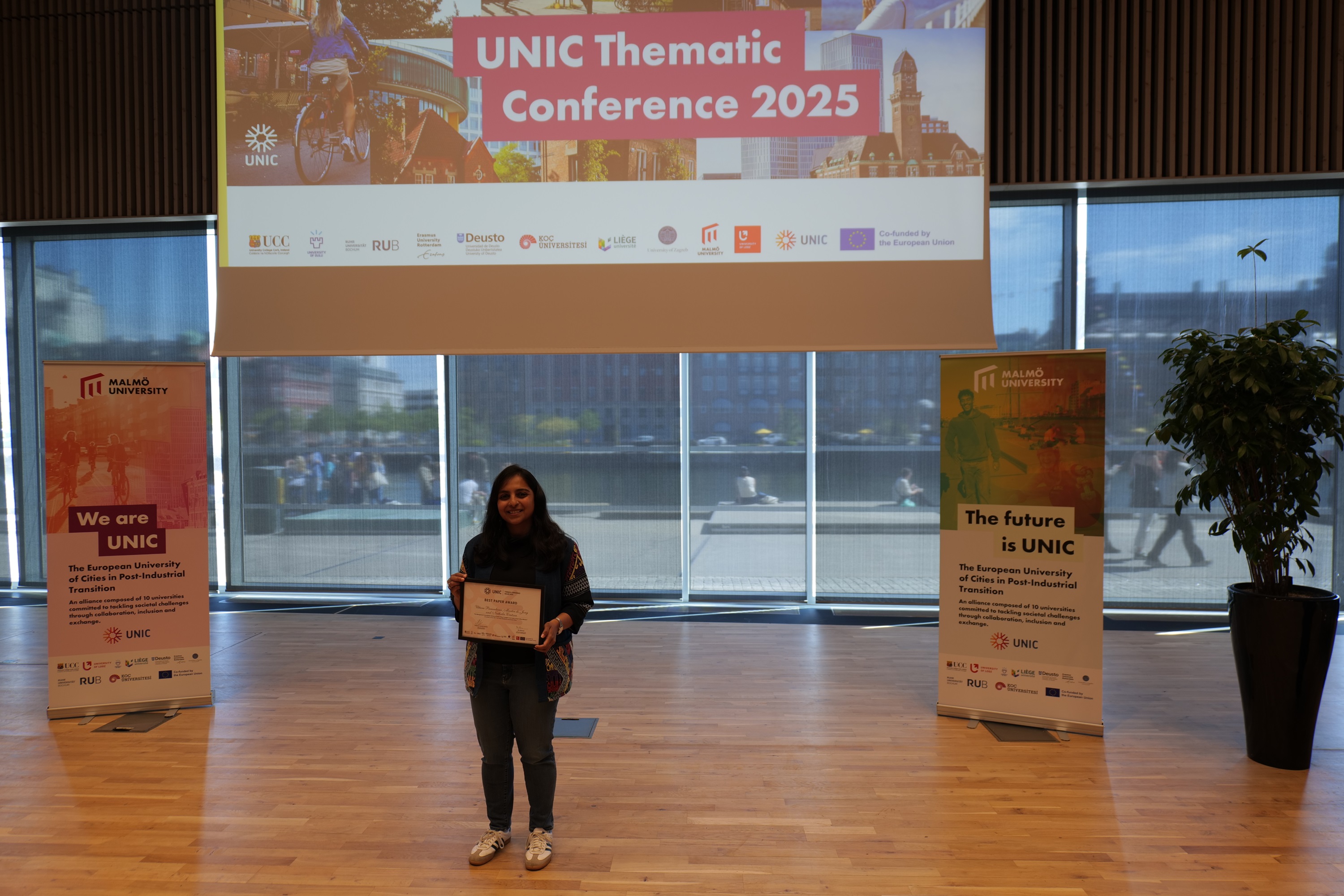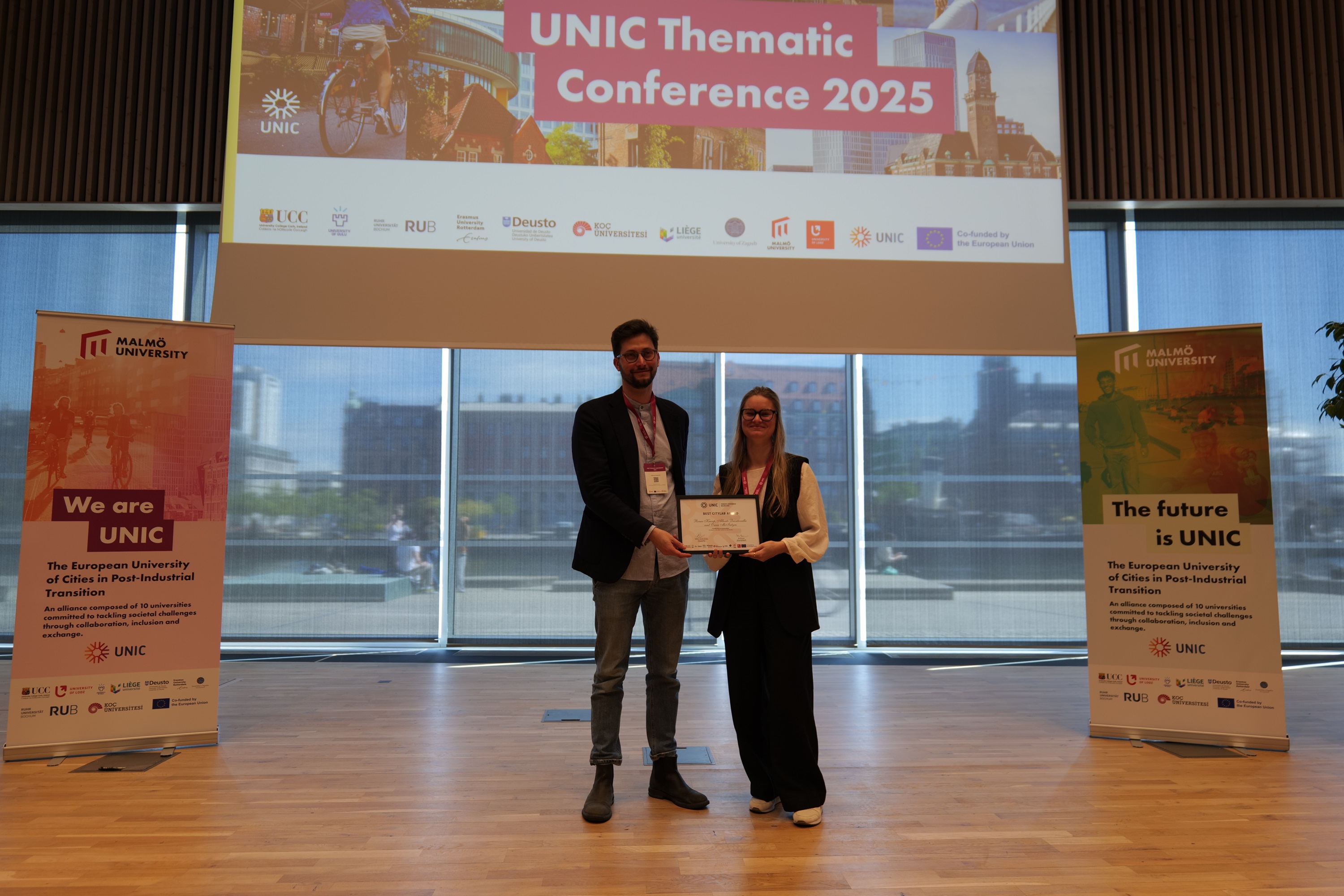The UNIC website uses cookies to improve your experience. Read our full Cookie Policy here.

The two Best Paper Awards announced today recognize outstanding work that align with UNIC's mission to foster resilience and renewal in Europe’s post-industrial urban centers. Open to original, unpublished or published papers on the themes of Urban resilience, sustainability and the future of inclusive post-industrial societies, they were judged through a diverse, cross-institutional peer process that found them exciting contributions to UNIC’s evolving Thematic Lines.
The Best CityLab Award recognized outstanding CityLab initiatives that apply innovative and impactful methodologies to address societal challenges in Europe’s post-industrial cities. UNIC CityLabs are applied, living, collaborative initiatives and challenges being tackled through partnership between our universities, cities, and citizens. They are a key engagement tool of the UNIC Centre for City Futures, a transnational urban living laboratory for societal impact and “one stop shop” for UNIC universities to engage with cities and communities on pressing urban challenges.
We were thrilled to receive many entries from across the alliance for these awards, tackling issues ranging from societal participatation and ”smart cities” to city branding and sustainability. "These awards not only testify to the academic excellence and civic engagement of our fellow colleagues, but they also make the UNIC community visible and recognized," said Alessandro Mazzola, co-coordinator of UNIC’s Community of Researchers (”Work Package 5”) and the UNIC Thematic Conference.
Meet the winners and their work below, and learn more about how their research can make an impact:

Best Paper Award #1:
Breffní Lennon and Niall Dunphy
(University College Cork)
“Sustaining energetic communities: energy citizenship and participation in an age of upheaval and transition”
The human use of energy is at the heart of our current global upheavals, from climate and biodiversity to geopolitcs and conflict. Building on UNIC’s Thematic Line ”Sustainability and Green Cities”, Breffní and Niall’s compelling work underscores how the correlation between the (meta)physical flows taken by the various forms of energy we depend on—and the transitory social, cultural, economic, and political relationships that frame them—require much deeper study if we are to achieve the types of sustainable communities envisaged by the United Nations as part of its sustainable development goals (SDGs) for 2030.
Through a review of current literature, they present recent research into the forming of citizen energy communities in Europe and the governance structures designed to facilitate their development. It asks: ”what are the key drivers and barriers to citizen engagement with emergent, novel energetic communities?”
”I’m very much honoured to be aknoweldged in this way, given the depth of knoweldge that is existing in UNIC amongst the different researchers. I’m very delighted to be recognised by peers,” said Breffní Lennon. "The paper looks at the drivers, motivations, and barriers to participation. Citizens will decide if and how to engage or not to engage for a variety of intersecting reasons; the paper explores some of those issues."

Best Paper Award #2:
Uttara Purandare, Martin de Jong and Nathalie Crutzen
(University of Liège and Erasmus University Rotterdam)
“Do Management Consultants Influence Public Policy? Insights from India’s Smart Cities Mission”
When the ”smart city” concept first gained traction, it was portrayed to be radically transformative—technologically driven and rationally governed through data. Proponents imagined a level of efficiency that has long eluded governments, while critics saw a privatised surveillance state.
Uttara, Martin and Nathalie’s work, which builds on UNIC Thematic Line ”Urban Resilience and Smart Cities”, takes stock of two decades of the concept, and shows how smart cities are quite far from either of these conceptualisations. With less sweeping statements and hype, the field is enriched with new questions and empirical research.
Their paper analyzes the expertise that guided smart city interventions, looking at India’s ”100 smart cities policy” that has seen only middling success since launching in 2015. What are the ways in which this expertise has impacted the implementation of the policy? Through interviews and documentary analysis, it finds that management consultants were heavily depended upon to design and implement the policy at the federal and local levels, leading to knock-on effects on inclusion and participatory planning.
“In the Indian case, we find that consultants' influence at the city level is much more significant than it is at the federal level,” said Uttara Purandare. "What’s interesting for us to argue and to start to use moving forward is that there is this sort of uneven hollowing out effect that happens, but that consultants can be partners to policy developments. However, this has to be preceded by the strengthening of local capacity."
"It’s very exciting to receive this award,” she adds. "It’s really great that this paper, which focuses on public policy in India, has been recognized at the UNIC conference. It points to UNIC’s commitment to superdiversity and the fact that, as a consortium, we really can build on knowledge from across the world, and that this knowledge can impact and speak to experiences even within Europe."

Best CityLab Award:
Renée Knoop, Alberto Quintavalla, and Owen McIntyre
(Erasmus University Rotterdam and University College Cork)
“Perspectives on Sustainability”
This pan-alliance CityLab project between Erasmus University Rotterdam and University College Cork grew out of an LL.M. course, ”Perspectives on Sustainability’”, taught by Dr Alberto Quintavalla and Ms Renée Knoop in Rotterdam. The course examined the manner in which the concept of sustainable development had permeated society and shaped policies, laws, and practices across the layers of the global governance system.
Building on the work of the UNIC Centre for City Futures, the duo added a comparative element to the teaching mix by bringing their students together with students and researchers from University College Cork, as well as local stakeholders, all discussing and reflecting on the challenges that stood before two post-industrial cities, Rotterdam and Cork.
The initiative is a proof of concept of a groundbreaking model of applied learning and collaborative engagement, serves as a dynamic platform through which students across cities can engage with peers, researchers, citizens, and city stakeholders – including municipalities, the private sector, and NGOs – from across the continent. In this way, learning and sharing become opportunities for co-creation, knowledge exchange, and meaningful reform.
"We started by outlining and explaining the theoretical dimensions of sustainable development and all the legal, economic, and policy aspects that revolve around it,” said Alberto Quintavalla. “Then, we decided that this knowledge was very theoretical, and we wanted to put it into practice. So, we wanted to confront students with what sustainable development actually is at a municipal level or in practical settings."
The Municipality of Rotterdam, through the presence of Maarten Nijpels, was proud to be represented—showcasing its commitment to the UNIC Alliance.
Congratulations to all the winners! The alliance celebrated their work and achievement at a special award ceremony today at the 2025 UNIC Thematic Conference, where they were presented with certificates by alliance coordinator Prof Dr. Semiha Denktaş. In addition, winners will receive monetary support through UNIC funds at their respective home institutions.
Learn more about UNIC Thematic Lines here.
A Master’s Thesis Journey from Bochum to Oulu with UNIC - Exploring Gr...
Geography student Alina Grunwald, Ruhr University Bochum, is writing her master's thesis on gr...
02 Jun 2025
Read more »Urban Resilience in European Post-Industrial Cities: Takeaways from UN...
Professors Satu Nätti and Jarkko Saarinen share their insights to Urban Resilience and experie...
02 Jun 2025
Read more »MITIME: Helping Shape the Next Generation of Migration Scholars
UNIC’s new interdisciplinary PhD programme, led by the University of Oulu, is a pathbreaking n...
27 May 2025
Read more »